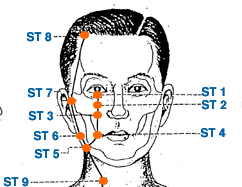ST 1
Acupuncture Point Theory
ST 1 Acupuncture Point Applications and Theory
 The acupuncture point "ST 1" , 承泣, is represented by "Chengqi" in pinyin and "Tear Container" in english and may be found:
The acupuncture point "ST 1" , 承泣, is represented by "Chengqi" in pinyin and "Tear Container" in english and may be found:
Below the pupil, between the eyeball and the infraorbital ridge.
Of many possible clinical applications, it may be considered to influence the following issues/symptoms:
- Any eye issue, although ST 2 is a good alternative and arguably safer to needle.
- Excessive lacrimation, redness, dryness, painful a/or itchy eyes/eyelids, twitching of the eyelids.
- Visual disturbances, night blindness.
ST 1 has some precautions to be considered (see our precautions list).
Avoid Moxa (MX)
Slow insertion, no manipulation.
St 1 has the following theoretical associations which serve as important guideposts in designing an effective treatment protocol:
- Entry Point.
Explore st 1 functional grouping theory - Entry Exit Point, or read all point categories and related theory.
A single acupuncture point is not commonly thought of as an empirical way to influence a TCM diagnostic pattern. ST1, however, is a strong candidate to be incorporated into an acupuncture protocol for patients who exhibit: Liver Wind
ST 1 may potentially be used, in coordination with a well designed acupuncture treatment protocol, to influence the following conditions: Eye Problems and/or Vision Problems
While not necessarily valid clinically, EX Yintang ( Calms the spirit - insomnia, anxiety, stress.…) and UB 2 (Local point for sinus congestion a/or headache. …) are nearby.
All Content 1999-2025
Chad J. Dupuis / Yin Yang House
Our Policies and Privacy Guidelines
Our Affiliated Clinics
